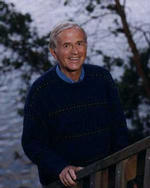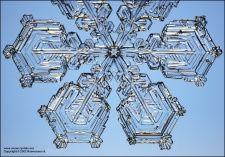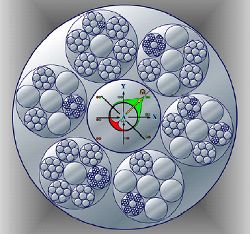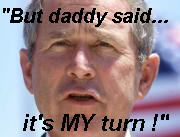| Monday, March 10, 2003 |  |
|
|
|
 Dee Hock sent a fascinating e-mail to Joi Ito, commenting on emergent democracy, blogging, power and other interesting things. Dee Hock is the father of chaordic thinking, and the guy who created the VISA organization. And this is delightfully subversive stuff. Dee Hock sent a fascinating e-mail to Joi Ito, commenting on emergent democracy, blogging, power and other interesting things. Dee Hock is the father of chaordic thinking, and the guy who created the VISA organization. And this is delightfully subversive stuff." It is futile to directly challenge such institutions, political or commercial, for they have an oligopoly on power, money and instruments of compulsion. Nor do they hesitate to use them if threatened. However, they will prove to be vulnerable, rusted out hulks if confronted with new and better ideas of organization which transcend and enfold them. Ideas that excite the very people they expect to remain passive. What they cannot resist is the searchlight of informed public opinion. Once the public begins to withdraw relevance from them they are helpless, as Gandhi so ably demonstrated in India. While I don't begin to understand Blogging, your paper set something turning in the back of my mind that whispers it may be one of the keys to the puzzle.
I wonder if you realize that a dozen or two people like yourself with the right combination of communication, technological and organizational skills could design and implement a global government without the consent of any present form of organization and provide it with the neural network to insure its success. A government that could continually evolve to ensure that no matter affecting the public good or the health of the planet fails to be disclosed, examined and understood. Or that any existing organization could escape being confronted with synthesized opinions and alternatives that would swiftly emerge. Such an organization based on rights of participation and withdrawal and consent of the participants could be something entirely new in this tired world. Now that would be something truly worthy of the best within us and the best among us." He's not talking about a traditional government, you know, that wields power over people. What he's saying is that a few dozen dedicated people with fairly modest funding could change everything, by setting up a system that analyzes and understands all matters and activities important to society, and shares the information openly and widely, so that people can make informed decisions by themselves, based on the truth. He's right. Everything would change. I think that is an extremely profound vision and observation, and a very worthy goal.
[ Organization | 2003-03-10 18:02 | | PermaLink ] More >
|
|
|
|
 Cool pictures of snow crystals. Thanks Seb. And Michael Wilson found this site about how snow crystals are formed. Cool pictures of snow crystals. Thanks Seb. And Michael Wilson found this site about how snow crystals are formed.
[ Nature | 2003-03-10 18:33 | | PermaLink ] More >
|
|
|
|
Ton Zijlstra says a lot of good stuff about knowledge sharing and blogs, like here and here."Sharing knowledge is where a storyteller recounts a story that is particularly relevant to the listener at this time, otherwise it would fall on deaf ears, and no sharing would take place, only broadcasting. Knowledge sharing takes place in dialogues, wether in real time or not, where all parties take on the role of both story teller and listener. In practice this is not often a clear cut case: I acquire knowledge by listening to different storytellers, with knowledge sharing moments on parts of the eventually obtained knowledge. Knowledge sharing is sort of information bartering.
From any piece of knowledge I cannot describe who shared it with me: it is the resulting amalgam of all information inputs on a certain subject, of listening to multiple storytellers. Sometimes I can name influential sources, sometimes I cannot. Learning is mostly a voyage of discovery, a journey of listening, where only in the end, not along the way, I might have something to say on what brought me to my goal. It is an evolutionary process, with no clear view of what will be the red thread and what will be dead-end sideroads at the start. What can help me along on my road of discovery is relationships, storytellers who can point to other storytellers." Also, look at the KnowledgeSharing wiki page started by Denham Grey.
[ Organization | 2003-03-10 19:07 | | PermaLink ] More >
|
|
|
|
 Timothy Wilken writes in Dymaxion: Doing More with Less: Timothy Wilken writes in Dymaxion: Doing More with Less:"When we examine the biological needs of a number of single celled organisms surviving as individuals versus the needs of the same number of cells working together within the body of an organism, we find the cells working together are able to reduce their biological needs by 100 to 1000 times. The bodies of all living systems are organized synergically. That means the cells work together and solve the problems of survival as a unified team. Imagine, what could be possible if the entire human species were a single organization. The synergic strategies of Ortegrity could be used to organize all of humanity into a single level 12 Ortegrity up to a limit of 13,841,287,201 humans. In our present world, with its obsession with growth and growing larger, whenever I have presented the Ortegrity to business people, they have been excited by the possibility of increasing production. However, they tend to overlook the point that these systems could be 100 to 1000 times more efficient. Now being more productive doesn't mean you have to produce more. It also means you could produce what you need in less time and then have more time for yourself and your family. Being more efficient means you can do with a lot more with less energy and matter. ...What this efficiency means is that the ecological footprint of 6 billion synergically organized humans could be as low as that of 60 million to 6 million of today's adversary-neutrally dis-organized humans." I believe that. Of course we need to be organized synergetically. And, for that matter, I don't think we inherently need to have ANY footprint. The rest of nature recycles everything. Timothy is inspired very much by Bucky Fuller and Alfred Korzybski, who are two of my heroes as well. There's a whole book in that Ortegrity link, with lots of neat stuff. "Ortegrity" refers to a way of organizing, supposedly scalable to the size of humanity. I don't quite understand it, even after looking over the document. And, well, despite that I agree in the aim of helping humanity self-organize in a synergetic way, I'm very skeptical of any scheme that involves numbers that are too neat. You know, people work together in group of so-and-so many, that are part of bigger structures with so-and-so many elements. And I'm skeptical of the intention to avoid conflict. There is productive conflict and unproductive conflict. Personally I enjoy having a good argument once in a while, and I think more gets done if there's a healthy element of competition. Synergy doesn't mean lack of conflict in my book.
[ Organization | 2003-03-10 21:52 | | PermaLink ] More >
|
|
|
|
 Unbelievable. Even George Bush the elder is apparently taking issue with his son's actions. Read this article about George Bush Sr giving a speech at Tufts University in Massachussetts. Unbelievable. Even George Bush the elder is apparently taking issue with his son's actions. Read this article about George Bush Sr giving a speech at Tufts University in Massachussetts.The first President Bush has told his son that hopes of peace in the Middle East would be ruined if a war with Iraq were not backed by international unity.
Drawing on his own experiences before and after the 1991 Gulf War, Mr Bush Sr said that the brief flowering of hope for Arab-Israeli relations a decade ago would never have happened if America had ignored the will of the United Nations. [...]
The former President’s comments reflect unease among the Bush family and its entourage at the way that George W. Bush is ignoring international opinion and overriding the institutions that his father sought to uphold. Mr Bush Sr is a former US Ambassador to the UN and comes from a family steeped in multi-lateralist traditions. Let me say it again. However many faults the previous U.S. presidents have had, they've largely acted coolly and presidentally in their foreign policies, even if they didn't in their personal lives. Bush Jr. is more like a regular dysfunctional guy, a spoiled rich kid, coke-head, dry drunk, mood swinging, vengeful, angry, learning about the world by sitting in his underwear watching TV, and acting as if he somehow won the whole thing in the lottery.
[ Politics | 2003-03-10 22:13 | | PermaLink ] More >
|
|
|
|
Another tidbit from the Japan Media Review article "A New Set of Social Rules for a Newly Wireless Society", written by Mizuko Ito, Joi Ito's sister:"One college student I spoke to described leaving one's phone at home or letting the battery die as "the new taboo." Teens and twentysomethings usually do not bother to set a time and place for their meetings. They exchange as many as 5 to 15 messages throughout the day that progressively narrows in on a time and place, two points eventually converging in a coordinated dance through the urban jungle. To not have a keitai [cellphone] is to be walking blind, disconnected from just-in-time information on where and when you are in the social networks of time and place."
[ Culture | 2003-03-10 22:51 | | PermaLink ] More >
|
|
 Dee Hock sent a fascinating e-mail to Joi Ito, commenting on emergent democracy, blogging, power and other interesting things. Dee Hock is the father of chaordic thinking, and the guy who created the VISA organization. And this is delightfully subversive stuff.
Dee Hock sent a fascinating e-mail to Joi Ito, commenting on emergent democracy, blogging, power and other interesting things. Dee Hock is the father of chaordic thinking, and the guy who created the VISA organization. And this is delightfully subversive stuff. Cool pictures of snow crystals. Thanks Seb. And Michael Wilson found this site about how snow crystals are formed.
Cool pictures of snow crystals. Thanks Seb. And Michael Wilson found this site about how snow crystals are formed. Timothy Wilken writes in Dymaxion: Doing More with Less:
Timothy Wilken writes in Dymaxion: Doing More with Less: Unbelievable. Even George Bush the elder is apparently taking issue with his son's actions. Read this article about George Bush Sr giving a speech at Tufts University in Massachussetts.
Unbelievable. Even George Bush the elder is apparently taking issue with his son's actions. Read this article about George Bush Sr giving a speech at Tufts University in Massachussetts.